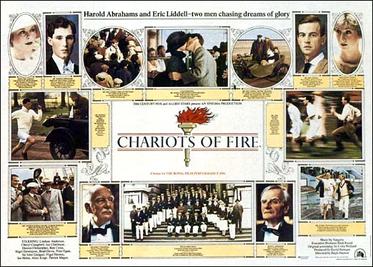Early in the film Chariots of Fire (1981), a working class chap comments apropos of two Cambridge students that British young men fought a hellish war (World War I) so that “shits like [the two students] could get a decent education.” But the wealthy need not be ashamed—here, they’re clearly not a bad lot—and the fought-for Great Britain is loved by its citizens, young men and the rest.
Of course Great Britain is imperfect, as is the twentieth century. If it is not banal to say so, where perfection exists is in commitment to something worthwhile, and so Cambridge student Harold Abrahams (Ben Cross), a Jew, is committed to a Jewish victory in competitive running. This in the midst of British anti-Semitism. There is also commitment in Eric Liddell (Ian Charleson), a Scottish Christian and another runner, and this is good. A modern Britain, after all, seems to pose a desultory threat to religion: it balks at Liddell’s refusal to run a heat on Sunday. It is a favor done by a particular Cambridge student which enables the young man to participate (in the 1924 Olympics). In Chariots of Fire, many moments of light, in England, follow the terrible war years. Granted, there is nothing redemptive in all the Olympic running, but what about the religious lives of people—religious dedication?


Leave a Reply